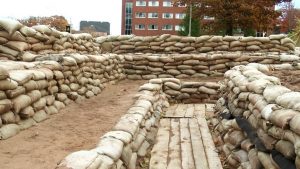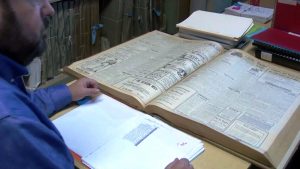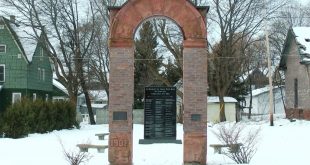While Michigan Tech is participating in a community wide remembrance of World War I, it was recently discovered that the University’s involvement with the war effort was more entailed than expected.
 On the campus of Michigan Tech is a replica firing trench that was built last month and opened for display as part of World War I and the Copper Country, a commemoration of the area’s involvement with the war, now marking the passage of 100 years since its end.
On the campus of Michigan Tech is a replica firing trench that was built last month and opened for display as part of World War I and the Copper Country, a commemoration of the area’s involvement with the war, now marking the passage of 100 years since its end.
Associate professor and historian Steve Walton, who led the trench project, recently uncovered more information that directly ties the University and trench digging to the war effort. “I knew it would be relatively easy to find because Michigan College of Mines did do stuff with the war department through World War I and the War Department keeps all of its records. Luckily it was filed by state and then by school,” said Walton.
While browsing through the National Archive files in Washington DC, Walton found a report that shows collaboration between the university, area mining companies, and the War Department that would ultimately train soldiers in digging likewise trenches.
 “President McNair of Michigan Tech decided very quickly to support the war effort. McNair got agreements with the local mining companies, Quincy, C&H, and the one out on Canal Rd., to send some of their managers and miners to campus to help train the trainees. What they did was they trained a total of 600 men in 200 man blocks starting in the summer of 1918,” Walton said.
“President McNair of Michigan Tech decided very quickly to support the war effort. McNair got agreements with the local mining companies, Quincy, C&H, and the one out on Canal Rd., to send some of their managers and miners to campus to help train the trainees. What they did was they trained a total of 600 men in 200 man blocks starting in the summer of 1918,” Walton said.
Michigan Tech, which was known at the time as the Michigan College of Mines, was an obvious choice for such a program and made way for military presence on campus that still exists today. Walton said, “They also had things like drilling competitions on campus as well as regular military training. By the fall of 1918, the regular student Army Training Corps, which is what we now call ROTC, was in session and all the students at Michigan Tech we enrolled in that. 335 students at the time, I believe. And in the end Michigan Tech claims to have trained over 700 men for the war effort.”
 As the war ended, so did the full scale training program. And although the documentation is not clear, Walton believes that the third block of 200 soldiers may not have completed the training. “Just at the time that they were supposed to arrive, we had the influenza outbreak and the war ended, so we don’t know what happened with them but we trained at least 400 men,” he said.
As the war ended, so did the full scale training program. And although the documentation is not clear, Walton believes that the third block of 200 soldiers may not have completed the training. “Just at the time that they were supposed to arrive, we had the influenza outbreak and the war ended, so we don’t know what happened with them but we trained at least 400 men,” he said.
Walton plans to publish a more detailed report of his findings in the future. “The report itself at the National archives is only 15 pages, but it was in two file folders which probably have 200 pages of weekly reports, correspondence between the war department and McNair back here at campus. It really will flush out our understanding of how Michigan Tech stepped up for WWI participation.”
As World War I and the Copper Country continues through November 11th, a Family Bazaar is scheduled for this weekend at Dee Stadium including reenactments, a fashion show, and other activities such as dancing. The event is free to attend and takes place on Sunday beginning at 2:00 pm.
 Keweenaw Report Your Source for Local News and Sports
Keweenaw Report Your Source for Local News and Sports





